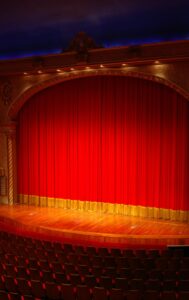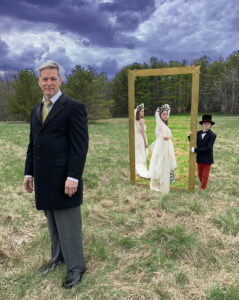Scenes from a Darkened Stage
Description

This workshop gave a voice to those who were directly impacted by the pandemic in the performing arts sector. Ten Maine actors joined playwright, director, and producer Stephen Legawiec as he explored the impact of the coronavirus on theatre arts and artists in Maine. Legawiec, Artistic Director of the Camden Shakespeare Festival, helped other theatre professionals turn their stories of loss and resilience into recorded dramatic monologues.
The workshop encouraged participants to find their own unique voice while creating an engaging piece of dramatic writing and performance. Workshop sessions included developing original material, finding one’s voice, and shaping the writing. In all, there were eight sessions over the course of three months, resulting in self-recorded monologues from ten Maine actors representing theatre, film and television.
On Friday, April 23rd, a selection of these videos were shown during a live event organized by the Fred Hutchinson Center, the University of Maine’s outreach and education campus in Belfast, Maine. This date also marked the official YouTube release of all ten recorded workshop monologues. To view all ten actors’ monologues on YouTube, CLICK HERE. To view the full recording of the live event, including an in-depth discussion with Legawiec and several actors, CLICK HERE.
Instructor Bio
In his 30 years in professional theatre, Stephen Legawiec (le-gahv-yetz) has curated over 100 professional productions as well as directing over 75. He is the author of 30 plays, including the award-winning Aquitania and the critically acclaimed Red Thread, which won the 2003 Garland Award for Los Angeles Production of the year, as well as Play of the Year. He is Artistic Director of the Camden Shakespeare Festival, which he also founded. Legawiec has taught acting, directing and playwriting, and has worked with both professional and non-professional actors for over 30 years. He has worked extensively with the dramatic monologue form.
Workshop Results
This essay is by workshop instructor Stephen Legawiec.
The idea behind this project was to have actors write monologues about their experiences as artists during the pandemic, and then to have them perform those monologues. We had ten actors who I invited to participate in this project and, with the exception of two of them, I knew or had worked with all of them before.
The workshop consisted of eight sessions meeting once hour a week. By and large, I looked at this as a writing workshop, and the writing experience of the actors was extremely varied. Some had dramatic writing experience, some had experience writing prose, while others had no writing experience at all.
“Taking part in this workshop was the highlight of my fall. I had not written a monologue prior to this and I am grateful that I got to explore and create with a group as creative, honest and kind as this group was. With theaters being closed and social contact limited to Zoom calls and waves from six feet away, taking an hour a week to collaborate and share in the creation of theater with others from around the state was an absolute gift.”
– Workshop participant
The culmination of the workshop was to have the actors write a monologue which they would perform, word for word. Nothing would be ad-libbed or improvised in the final performance. And although they were presenting true material and playing themselves, the piece still needed to be “acted.”
Autobiographical monologues are a legitimate form of theatre and all performers who do them have to rehearse scrupulously. Spaulding Gray, Whoopie Goldberg, John Leguizamo and Billy Crystal are famous names that come to mind who have all worked in the theatrical, autobiographical genre.
I did not concentrate or the performance aspect at all, as all of the participants had a lot of acting experience. Once everyone’s monologue was in a good final form, I let them deliver it in whatever way they chose. I knew they would all have good instincts about this.
“…Stephen’s monologue workshop was a wonderful oasis during these ‘unprecedented times.’ Getting to work with other artists exploring how COVID-19 has affected us gave a sense of community when there was a severe lack of that very thing.”
– Workshop participant

